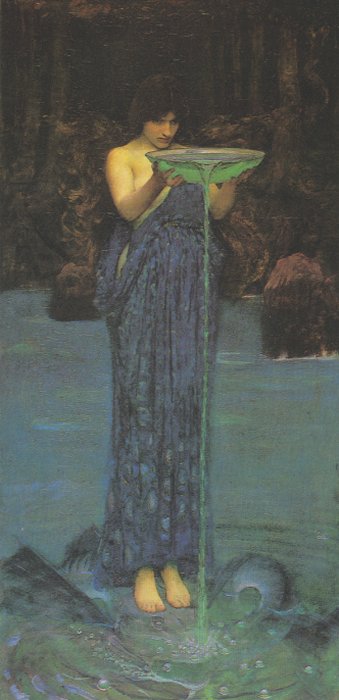Potions & Brews

Circe Invidiosa by John William Waterhouse
"Witches Healing Potion"
Witches potions used for healing,
Must be brewed with sincere feeling.
Use the herbs that work the best,
Then let Nature do the rest.
If you need an incanation,
Say the words with exclamation:
"With intent the potion bubbles
For good riddance of health troubles!"
~by Gerina Dunwitch
A Witches Brew Brew-Making
Midnight Lightning Slashes the stormy sky. Three haggard figures on a lonely hill lean over a huge cauldron. They throw noisome ingredients into the boiling water - poisonous herbs, noxious reptiles, snake venom - and cackle as steam rises and the wind howls like tortured demons.
So goes the standard brew-making scene, thanks in large to authors such as William Shakespeare. They vividly capture and firmly, implanted such powerful but absurd images in our minds. Brews (also known as potions) may be as prosaic as herb tea, or as mystical as rainbow infusion.
They stem from early magical, ritual and medicinal preparations, and are as effective today as they were thousands of years ago. In herb magic, brews are little more than herbal infusions or teas. They needn't be prepared over an open fire in a forest clearing, your own stove or backyard will do nicely.
Their are so many different kind of brews, some are drunk, some are added to the bath and others prepared to release fragrant steam into the air, infusing the area with the sum total of the herb's vibrations.
It's The Water
The type of water used in brewing is of some importance. Well, Spring & Distilled waters are preferred over that which pours from the tap. You can buy these bottled or collect them from the source, so long as it's unpolluted & free running. Rain water is ideal for use except when gathered in smoggy areas. Tap water can be used as a last resort, but consider purchasing the bottled variety in the future.
Distilled water is definitely better than chlorinated, fluoridated, bacteria-filled tap water. If it's all you have - use it. Sea water & Mineral water aren't recommended due to their high mineral content.
The Heating
Fire, gas flame or stove coils will do for the heat source. I suppose you could prepare a brew in a microwave oven, but this isn't the best idea. If nothing else, it reduce some of the magic of the process. If you're the old-fashioned kind, try making a brew in a fireplace or outdoors over a blaze.
The Vessels
NO METAL! It's best if the water and herbs don't come into direct contact with metal while brewing. There are few exceptions to this in Herbalism. One is cauldron brewing, which is little-practiced today. Herbal products prepared with double broilers may also require metal pots. But in general, avoid metal.
Clear glass jars work well for Solar infusions. Simply place the water and herbs into the jar and set this in direct sunlight,preferably outdoors. Leave it there for most of the day. Some brews ask for specific colored glass jars.
The Brew
Not every brew in this section is made in the following manner. Use specific instructions where given. Gather, grind & mix the herbs. For brews to be drunk, use specific culinary mortar & pestle for grinding, not the one used for heavy-duty magickal herbs.
Empower the herbs with your magical goal.
Heat about two cups of water to boiling. Place about one handful of mixed, empowered herbs in a teapot of some other heat- proof, non-metallic container. Pour the water over the herbs. Cover with an equally nonmetallic, steam-tight lid. Let the herbs brew for about 13 minutes.
Strain through cheesecloth or a bamboo strainer, and use as directed.
Brews should be used as quickly as possible. If necessary, they can be stored in the refrigerator for three or four days. After this time return them to the Earth and create a new brew.
A note regarding "love" potions. There are no drinks that will emotionally enslave another person to you, no brews that will cause love. However, some brews have long been celebrated for relaxing inhibitions and mellowing the emotions. Also, a few have been used to smooth over difficulties during long-term relationships and marriages.
~from 'The complete Book of incense, oils & Brews' by Scott Cunningham
 Free Forum Hosting
Free Forum Hosting